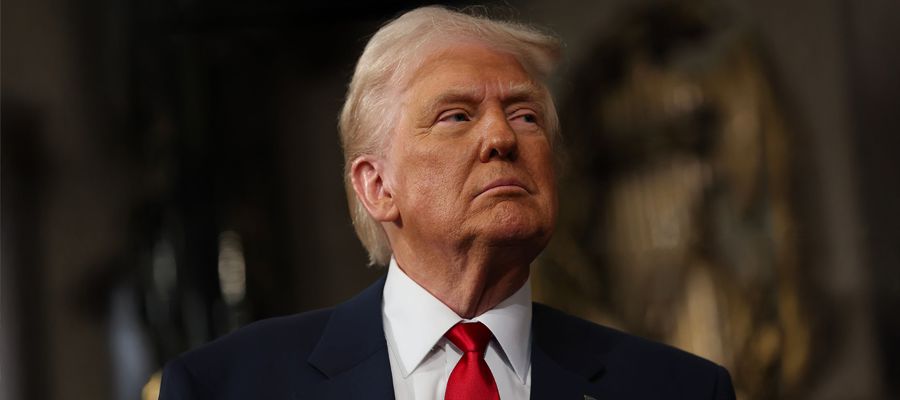Financial & Investment News
Keep up to date with financial news and information

Portfolio Update August 25
- Monday, August 11, 2025
 The Crossing Point Investment Committee have made a number of changes to the Growth portfolios to reflect recent developments in global markets, valuations, and trade policy.
The Crossing Point Investment Committee have made a number of changes to the Growth portfolios to reflect recent developments in global markets, valuations, and trade policy.
Macro Environment & Key Themes
The Trump administration’s broad tariff regime has created substantial uncertainty across global markets. Following the initial shock of the tariff announcements on Liberation Day in April, and the subsequent 90-day pause, macroeconomic impacts were initially more muted than expected, until last week’s surprise revision in US employment data.
The sharp rise of effective tariffs of up to 18% has introduced new uncertainties impacting sectors and regions differently. While some areas like AI, reshoring and tech earnings remain resilient, sectors like semiconductors and pharmaceuticals face risk from pending tariff specifics.
Equity Allocations
Global & US: We’ve maintained our overall US and international equity allocations but increased exposure to select sectors. We reduced small-cap holdings, particularly global small caps, due to concerns about their ability to adapt quickly to macro shifts. As dispersion across sectors increases, we believe active-tilted funds are better placed than broad indices to capture opportunities.
Europe: European equities performed strongly across the first half of the year, supported by low valuations and Germany’s fiscal stimulus plan. Despite still being at a discount relative to the US, Europe’s forward P/E ratio has now exceeded its long-term average. Risks persist from potential pharmaceutical tariff, geopolitical tensions (Ukraine/Russia, Israel/Palestine), and competitive pressure from Asian automakers.
UK: Despite economic headwinds, UK equity valuations remain significantly discounted relative to the US and also below their long-term averages and dividend yields are attractive. The UK has also benefited from relatively favourable US trade terms (10% tariff vs. 15% for the EU/Japan). Inflation has risen, prompting cautious monetary policy, though a weakening labour market may force the Bank of England to act sooner. Fiscal concerns persist under Chancellor Rachel Reeves. But, if global investors are looking to diversify their allocations away from the US, UK equities could benefit.
Japan: Japan continues to benefit from economic reinflation, governance reforms, and rising real incomes. The revised 15% US tariff (down from 24%) is a positive development. However, demographic challenges persist and political instability could delay policy normalisation.
Pacific and Emerging Markets: Emerging markets remain unevenly affected by tariffs, with outcomes shaped by geopolitics and sector exposure. China has reduced its US reliance and holds leverage through its dominance in rare earths. Despite recent equity declines, Chinese valuations now offer selective long-term opportunities. In contrast, India faces pressure from US trade scrutiny, a persistent deficit, and criticism over Russian oil imports.
Sector-Specific Adjustments
Infrastructure: Property funds have struggled in the higher-rate environment, with returns weakening since Q2. In contrast, infrastructure has held up well, supported by inflation-linked cash flows and fiscal spending. We exited property and added a US-heavy infrastructure tracker and a European-focused active fund, both offering strong diversification. These allocations provide greater stability and a natural macro hedge.
Technology: We have slightly reduced our allocation to the technology tracker fund to manage overlap with our broader US and international exposures. Nonetheless, we maintain conviction in the sector’s long-term prospects. AI, automation, and cloud services remain key growth drivers, with strong earnings resilience through 2025. Regulatory scrutiny remains a risk, but innovation continues to support valuations. We retained the value-oriented technology fund in more cautious portfolios.
Sustainable Energy: We exited our industrials fund and instead added a sustainable energy fund. This shift reflects both economic and structural trends. Renewable energy is increasingly mainstream and supported by long-term decarbonisation goals, especially in Europe. Exposure to companies involved in clean power generation, battery storage, and electrification aligns with policy momentum and investor demand. With a meaningful European weighting, this allocation supports diversification away from fossil fuels and taps into investment themes with enduring policy and consumer support.
Financials: We rotated out of the insurance fund and into a dedicated financials fund. US financials are expected to benefit from regulatory rollbacks under the Trump administration and delays in the implementation of Basel capital adequacy requirements. Elevated interest rates are also supportive of net interest margins, while market volatility boosts trading revenue for diversified institutions. This allocation helps balance more growth-oriented exposures with a value-oriented sector that benefits from the current macro backdrop.
Gold: We introduced a baseline allocation to a gold fund, accessed via a unit trust. While not holding physical gold, the fund serves as a proxy for gold prices to offer protection from geopolitical uncertainty and unanticipated policy shifts such as sudden tariff escalation. This small position enhances portfolio diversification and acts as a strategic hedge.
Fixed Income: Fixed income markets have been marked by a surprisingly heightened level of volatility. US Treasury yields rose after the April tariffs, amid concerns about Fed leadership and fiscal sustainability. UK gilt yields followed suit after uncertainty around Chancellor Rachel Reeves.
There was an expectation that the Fed would conduct two rate cuts by year-end. However, tariff-induced inflation and labour market pressures have added complexity. Markets are split between a cut in September vs. later in the year. Both the UK and US central banks are cautious but may be forced to act sooner.
We feel that in this ever-changing environment of uncertainty, actively managed bond funds will be able to navigate and take advantage of the volatility in duration, rates, and exchange rates.
Across all portfolios, we maintain an overweight to active funds to benefit from dispersion in earnings, business models, and sector outcomes under tariff pressures. Our approach blends strategic active funds that offer tilts toward quality, value, or income, with cost-efficient passive holdings that provide broad market exposure. This combination continues to serve clients well in a world where policy, inflation, and sector divergence demand thoughtful, evidence-based positioning.
